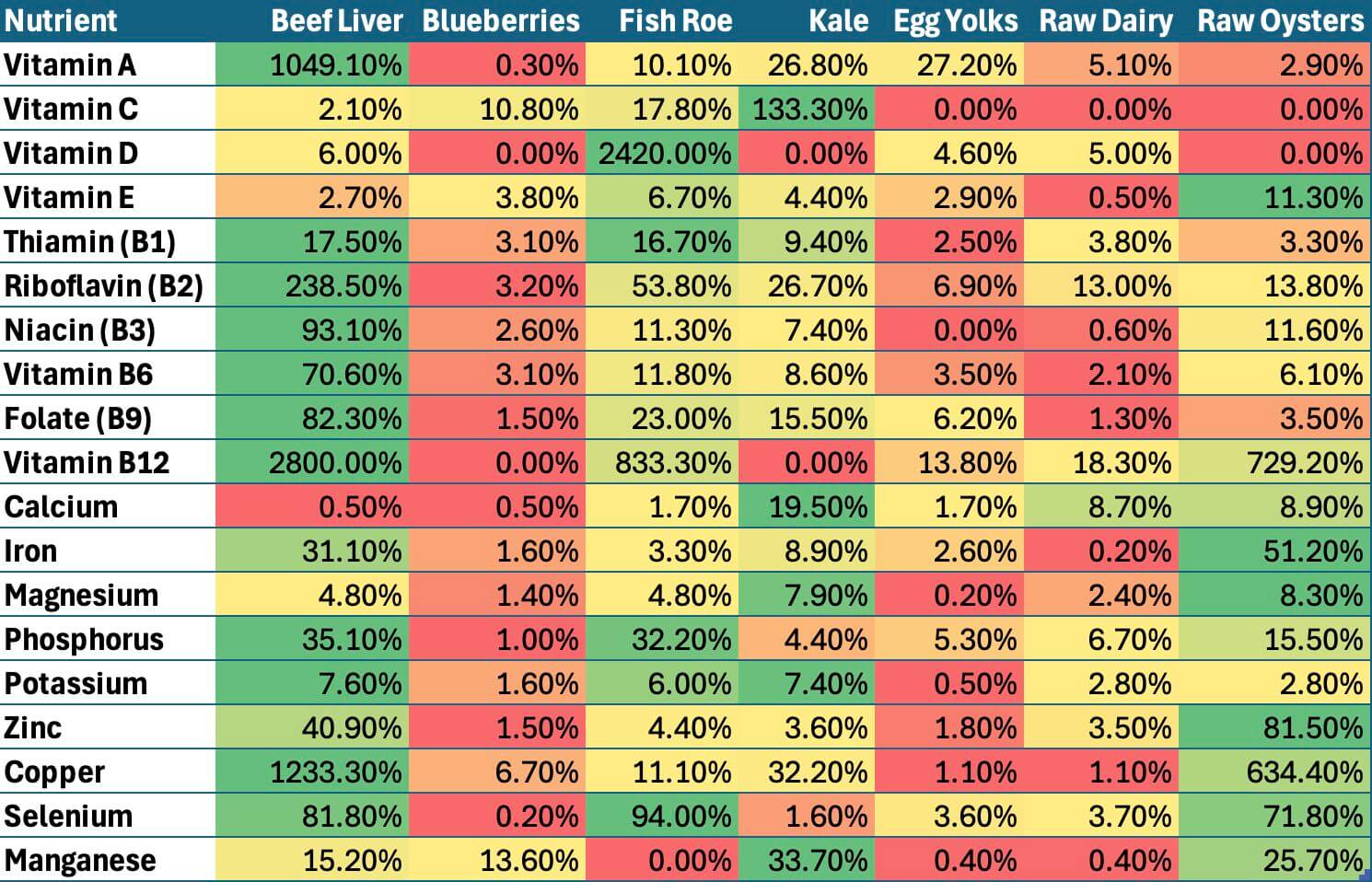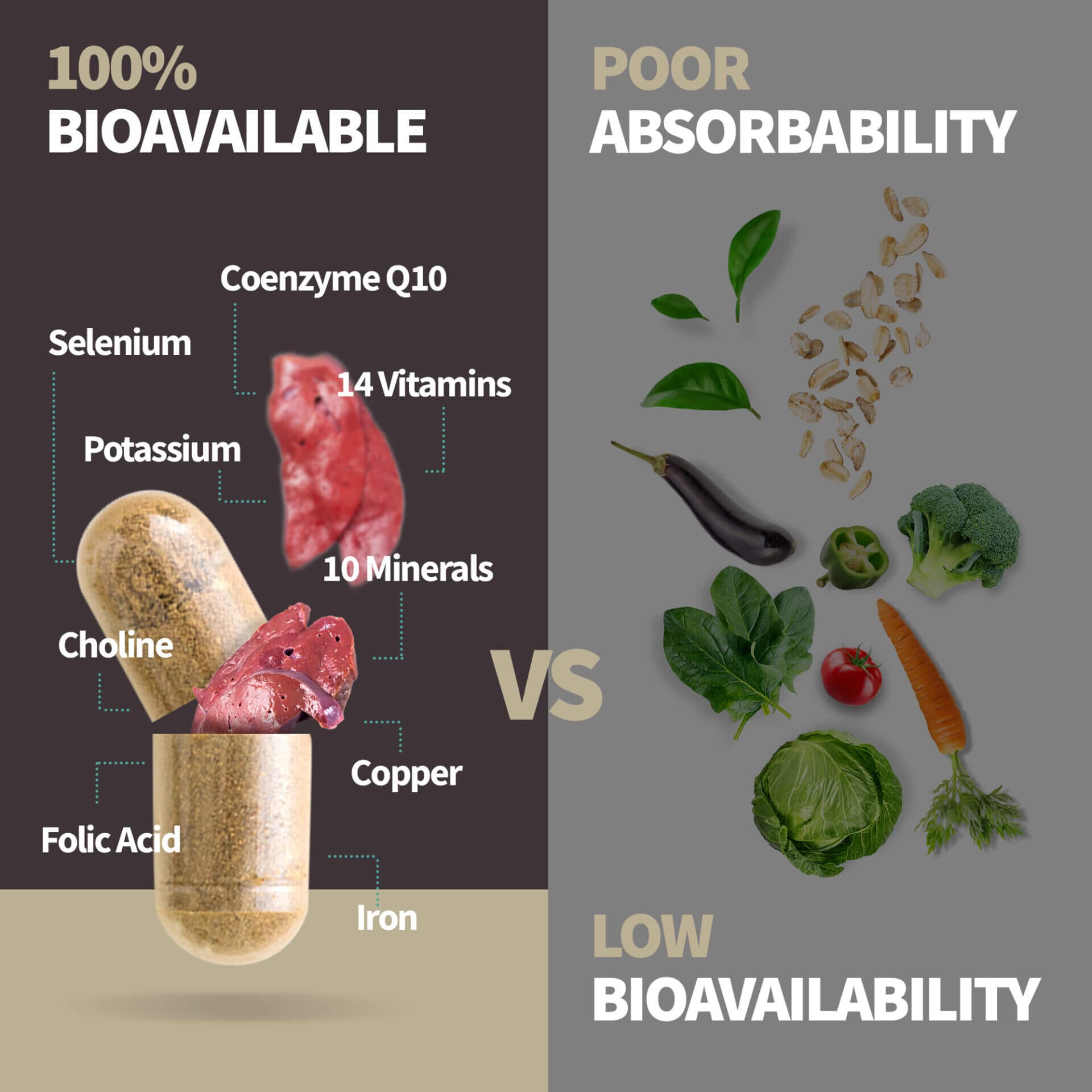Beef liver is one of the most nutrient-dense foods on the planet, packed with choline, copper, folic acid, iron, potassium, selenium, preformed Vitamin A, Vitamin D, Vitamin B12 and zinc. It’s also one of the few dietary sources of bioavailable Vitamin K2, which is crucial for calcium absorption (especially if you take calcium supplements or consume a lot of dairy).
Additionally, beef liver is a rich source of coenzyme Q10 (CoQ10), an important antioxidant that can help improve mitochondrial function, promote healthy aging and longevity, and improve brain and heart health.
In other words, beef liver’s diverse micronutrient profile provides the building blocks for a wide range of bodily functions, including support for the metabolism, immune system, skin, eyes, reproductive organs, mental health and more.

Eye Health and Vision
Retinol (aka the real Vitamin A) and B vitamins are some of the micronutrients that play a crucial role in vision and eye health.
One ounce of beef liver contains approximately 1,650 mcg of retinol or 183% DV. That’s over eight times the amount of retinol you get from one ounce of carrots, considering the poor beta-carotene-to-retinol conversion ratio.
Beef liver is also one of the best sources of most B vitamins. For example, one ounce of beef liver contains 45% DV of B2 and 20% DV of B5 and B9 – more than most other foods in the animal and plant world.
Retinol helps maintain a clear cornea (the outside covering of your eye), and is essential for producing rhodopsin, a pigment in the retina that is critical for vision in low-light conditions. It also prevents xerophthalmia, a condition characterized by dry eyes and damage to the cornea. It acts as an antioxidant, protecting the eyes from oxidative stress and damage caused by free radicals.
The B vitamins thiamine, riboflavin and niacin act as antioxidants, protecting the eye from oxidative stress and helping prevent cataracts, glaucoma and optic neuropathy, a condition that can cause visual impairment. Others, including pyridoxine, collate and cobalamin, are essential for DNA synthesis and repair, red blood cell formation and the lowering of homocysteine levels to reduce the risk of age-related macular degeneration (AMD).
Brain Health
The highly absorbable B vitamins (riboflavin, folate and B12), amino acids (anserine, carnosine, taurine and l-carnitine), choline and zinc in beef liver are vital for brain health and cognition.
One ounce of beef liver contains 277% of the daily value of B12, three to four times more than the next best sources (fish roe and raw oysters). And each one-ounce serving delivers approximately 100 mg of choline, equivalent to 20% of the daily value.
This is important because Vitamins B9 and B12 are vital for helping with the production of neurotransmitters, maintaining the myelin sheath (nerve cell insulation) and synthesis and repair of DNA.
Choline is a precursor to acetylcholine, a neurotransmitter critical for many functions, including memory and muscle control.
Energy and Mood
Beef liver is an excellent source of Vitamin B12, copper, heme-iron, CoQ10 and niacin, all crucial for energy, optimal exercise performance, metabolism and mood. Plus, its synergistic combination of vitamins and minerals can naturally boost energy levels by supporting mitochondria (the part of every cell responsible for energy production).
For example, the bioavailable heme-iron in beef liver is integral for hemoglobin production, which carries oxygen to tissues to support energy levels. Each one-ounce serving of beef liver has 28% of the daily value of iron. That’s only topped by beef spleen, which delivers a whopping 69% DV.
The Vitamin B2 (Riboflavin) in beef liver is a precursor of the coenzymes FMN and FAD, which are involved in the electron transport chain, a critical step in cellular energy production. Each one-ounce serving of beef liver contains a whopping 67% DV of B2.
Last but not least, beef liver is rich in B3 (Niacin), which the body converts to NAD and NADP, coenzymes that play a crucial role in redox reactions, including glycolysis and the Krebs cycle, which are essential for ATP production. The latter is the body’s energy currency and is crucial for energy production.
One essential process involved in energy production is called methylation, a biochemical process that involves the transfer of a methyl group (—CH3) to various substrates, including DNA, proteins, and lipids. Without going into the nitty-gritty of those various pathways, the nutrients listed above work together to support the methylation cycle, a key process in energy production.
In case you’re wondering, energy levels and mood are closely interconnected through various physiological and biochemical processes. For example, without adequate energy levels, your body can’t produce mood-altering neurotransmitters, including serotonin, dopamine, and norepinephrine. Low levels of those neurotransmitters negatively affect your mood and mental health.
Immune Function
Beef liver is an excellent source of immune-supporting micronutrients, including selenium, copper, zinc and retinol.
Selenium is a cofactor for the body’s antioxidant defense (glutathione peroxidase, thioredoxin reductase) and is vital for protecting cells from oxidative damage by free radicals generated during an immune response. In other words, selenium balances the body’s inflammatory response to pathogens.
Copper acts as a cofactor for several enzymes (cuproenzymes) involved in immune function. One such enzyme is superoxide dismutase (SOD), which plays a role in protecting cells from oxidative damage, similar to the role of selenium-containing enzymes.
Like selenium and copper, zinc is a cofactor for numerous enzymes involved in immune cell function, including thymulin, essential for T-cell function and cytokine production.
Most people don’t realize that Vitamin A (retinol) also plays a crucial role in immune function by supporting the production of white blood cells and enhancing the integrity of mucosal barriers, which are the body’s first line of defense against pathogens.
Skin Health
The hyaluronic acid, retinol, Vitamin B2, copper, zinc and selenium in beef liver are crucial for maintaining healthy skin and connective tissue.
Hyaluronic acid has the unique ability to retain water up to 1,000 times its weight, which helps maintain skin moisture and elasticity. Proper hydration keeps the skin plump and smooth, and reduces the appearance of fine lines and wrinkles.
Copper is a cofactor for lysyl oxidase, an enzyme crucial for cross-linking collagen and elastin. These proteins provide the skin with structural integrity and elasticity, making it firm and resilient. Additionally, copper is a component of superoxide dismutase (SOD), an antioxidant enzyme that protects skin cells from oxidative damage caused by free radicals. This helps in preventing premature aging and maintaining youthful skin.
Zinc and selenium reduce inflammation by modulating the immune response, which is beneficial for conditions like acne and dermatitis.
Similar to copper, retinol also supports the production of collagen to maintain healthy skin structure. Lastly, Vitamin B2 (riboflavin) helps repair and maintain skin cells and supports the metabolism of other B vitamins necessary for skin health.
Bone and Tooth Health
While beef liver isn’t a great source of calcium (one of the building blocks of bone and tooth tissue), it’s rich in the highly bioavailable Vitamin K2 (not to be confused with the much less bioavailable K1 in leafy greens).
Vitamin K2 activates osteocalcin, a protein that binds calcium to the bone matrix, enhancing bone and tooth mineralization. It also activates matrix Gla-protein (MGP), which prevents calcium deposition in arteries.
One ounce of beef liver has approximately 21 mcg of Vitamin K2, or 18% of the daily value.
Additionally, beef liver is a good source of phosphorus that works with calcium to build bones and teeth. Specifically, phosphorus is a key component of hydroxyapatite, the mineral complex that gives bones and teeth their rigidity. A one-ounce serving of beef liver offers 11% of your daily phosphorus needs.
Muscle Development
Beef liver is an excellent source of most micronutrients and certain macronutrients, including protein, which are vital for optimal muscle development. Specifically, beef liver contains all the essential amino acids (the building blocks of protein) necessary to build lean muscle tissue.
For comparison, three ounces of beef liver contains 23 grams of protein, compared to 26 grams of protein in muscle meat. Considering how many more micronutrients (vitamins and minerals) beef liver has compared to muscle meat, liver makes an excellent post-workout meal.
Speaking of micronutrients, in contrast to muscle meat, beef liver contains almost twice as much Vitamin B6, a coenzyme involved in the metabolism of amino acids. Vitamin B6 also aids in the synthesis of neurotransmitters and muscle glycogen.
Blood Health
Beef liver is rich in heme-iron and the vitamins B9 and B12. All three are critical for supporting optimal blood health.
Iron is a component of hemoglobin and myoglobin, proteins that carry and store oxygen in blood and muscle cells and facilitate oxygen delivery to tissues.
Only three ounces of beef liver contain 28% of your daily iron needs. While that’s less than what you’d get from beef spleen, it’s dramatically more than what you’d get from certain “iron-rich” plant foods. For comparison, three ounces of spinach contain only 0.045 to 0.61% DV of iron (depending on if you eat it raw or cook it) if you take the poor absorbability of the non-heme iron and the absorption-blocking oxalates and phytates in spinach into account.
As mentioned throughout this article, beef liver is incredibly rich in Vitamins B9 and B12. These vitamins play a crucial role in red blood cell formation in the bone marrow and in synthesizing nucleotides, which are the building blocks of DNA.
The factors outlined above explain why people with iron-deficiency anemia or low iron or ferritin levels are often prescribed by their healthcare professionals to consume fresh or freeze-dried beef liver. While that’s not a terrible idea, I recommend consuming freeze-dried beef spleen instead, considering its much higher iron content.
Metabolism
The ability to effectively convert food into energy (aka metabolism) requires optimal levels of specific micronutrients, including many of those B vitamins (B12, B2, B3, B5, B6, and folate), choline, iron, copper and selenium found in beef liver.
These micronutrients act as cofactors for enzymes involved in key metabolic pathways, such as glycolysis, the Krebs cycle, and the electron transport chain, facilitating the production of ATP and ensuring efficient energy metabolism.
For example, folate (B9) helps convert carbohydrates into glucose, which the body uses for energy. Vitamin B5 is necessary for synthesizing coenzyme A (CoA), which is essential for metabolizing fatty acids and carbohydrates.
Additionally, selenium supports the thyroid gland, which regulates metabolic rate.
Potential Downsides to Eating Beef Liver
Considering the nutritional powerhouse that beef liver is, are there any downsides to regularly consuming it?
The short answer is “no.” Despite what you might have heard from so-called experts, consuming beef liver regularly (or even daily) does not pose any significant health risk beyond that of food in general (e.g., contamination).
For example, one of the major concerns with consuming liver is Vitamin A toxicity. While it’s true that Vitamin A (retinol) is toxic in higher concentrations, there have only been a handful of case reports of people presenting with symptoms of Vitamin A toxicity after consuming real food (e.g., liver). Most cases of hypervitaminosis stem from the overconsumption of synthetic supplements.
As part of my research, I stumbled across one case report of acute Vitamin A intoxication of a 27-year-old who consumed 800 grams (1.76 pounds) of ocean perch liver. I’d argue that’s more liver than the average person would consume (especially daily). In other words, if you limit your consumption to a few ounces daily, you have little to worry about. Most people (even those who like liver) don’t consume it daily but once every few days.
I’ve also heard of people getting sick after consuming tainted raw deer or beef liver. That’s why I recommend cooking your liver if you don’t trust the source. I specifically recommend cooking the liver of wild game because it could be infected with parasitic worms (liver flukes).
Another concern that’s purely based on an incorrect understanding of how the liver works is heavy metal contamination. Most people are under the impression that the liver acts as a filter, filtering out and storing heavy metals and other contaminants. But the liver isn’t a filter that acts as a sieve. Instead, it processes toxins through metabolic pathways to render them harmless or easier for the body to eliminate. Of course, animals exposed to heavy metals (e.g., from the soil or feed) store some of those substances in their meat, including their organs. However, you won’t find higher concentrations of heavy metals in the organs than in the muscle meat.
Lastly, many consumers are concerned about the high levels of cholesterol found in the liver, fearing that this could negatively impact their own cholesterol levels. I talked about all the reasons why that’s a flawed assumption and why dietary cholesterol and high blood cholesterol are not anything you should worry about in my blog posts debunking common nutrition myths.
Final Thoughts: Eating More Beef Liver Is a Smart Idea

There is overwhelming scientific evidence that many people fail to get sufficient vitamins and minerals from their diet, due in large part to the fact that our society has replaced nutritious organ meats — something humans have eaten for millions of years — with factory-farmed meat products, highly-processed junk food (like breakfast cereals) and synthetic multivitamins.
But even plant-based foods have fewer nutrients than in the past, thanks to deteriorating soil quality, monocrops and the overuse of fertilizers and other chemicals.
Consuming beef liver is one of the easiest ways to add highly bioavailable micronutrients back into your diet.
For example, beef liver is jam-packed with valuable micronutrients like preformed Vitamin A, Vitamin B12 and iron (as well as many others). In comparison, synthetic multivitamins offer high amounts of mostly lab-grown nutrients that the body can’t absorb and thus gets flushed out via urine.
It’s also worth noting that beef liver is a good source of essential amino acids. (In fact, most of the calories in raw beef liver stem from protein.)
Despite the obvious health benefits of beef liver, most people don’t recognize it as the nutritional powerhouse that it is. I’d even bet that if you asked 100 nutritionists to name their top 10 superfoods, few if any would mention it.
Instead, they’d probably talk primarily about plant-based foods, such as kale, spinach, spirulina, chia seeds and some of the other usual suspects. While all of these plants have varying amounts of micronutrients, they also contain chemical compounds called antinutrients that bind minerals and prevent the body from absorbing them.
Animals run away or fight, but plants use chemicals (and sometimes thorns) to defend themselves. That’s nature’s way of discouraging animals (including humans) from eating them.
Beef liver doesn’t have antinutrients or any other inflammatory compounds that you could be sensitive or allergic to. The only downside to liver is that it has carbs in the form of glycogen (the storage vehicle of glucose and water). But I’d argue that the micronutrients in liver far outweigh the cons of consuming a few extra carbs.
While I highly recommend trying to get pasture-raised organ meat (including liver) back on the dinner table, I also understand that this isn’t as easy for everyone as I might make it sound.
At the Kummer household, we started including beef liver in our diet a few years ago. But we still don’t consume the variety and amount of organ meat that we should.
That’s why I believe including the right beef liver supplements (see my list of favorite brands) on top of a solid dietary framework — even if that doesn’t yet include the regular consumption of organ meat — is an excellent idea.

Michael Kummer is a healthy living enthusiast and CrossFit athlete whose goal is to help people achieve optimal health by bridging the gap between ancestral living and the demands of modern society.
Medical Disclaimer
The information shared on this blog is for educational purposes only, is not a substitute for the advice of medical doctors or registered dieticians (which we are not) and should not be used to prevent, diagnose, or treat any condition. Consult with a physician before starting a fitness regimen, adding supplements to your diet, or making other changes that may affect your medications, treatment plan or overall health. MichaelKummer.com and its owner MK Media Group, LLC are not liable for how you use and implement the information shared here, which is based on the opinions of the authors formed after engaging in personal use and research. We recommend products, services, or programs and are sometimes compensated for doing so as affiliates. Please read our Terms and Conditions for further information, including our privacy policy.
